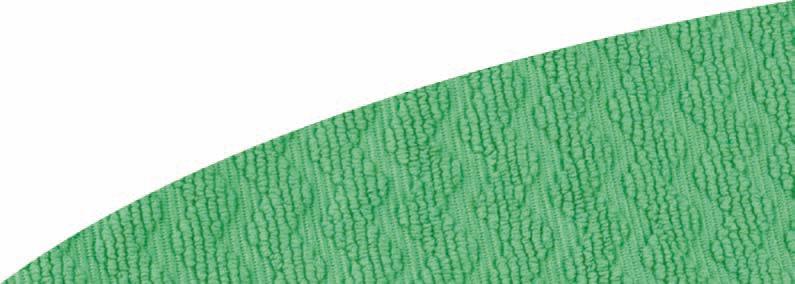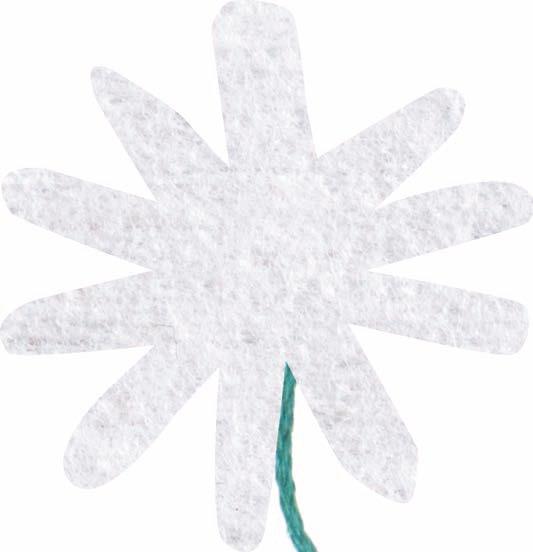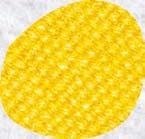TESTING SUMMARY


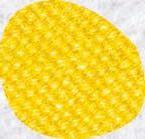


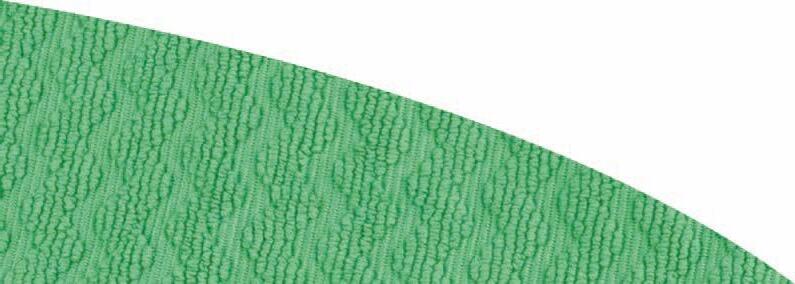
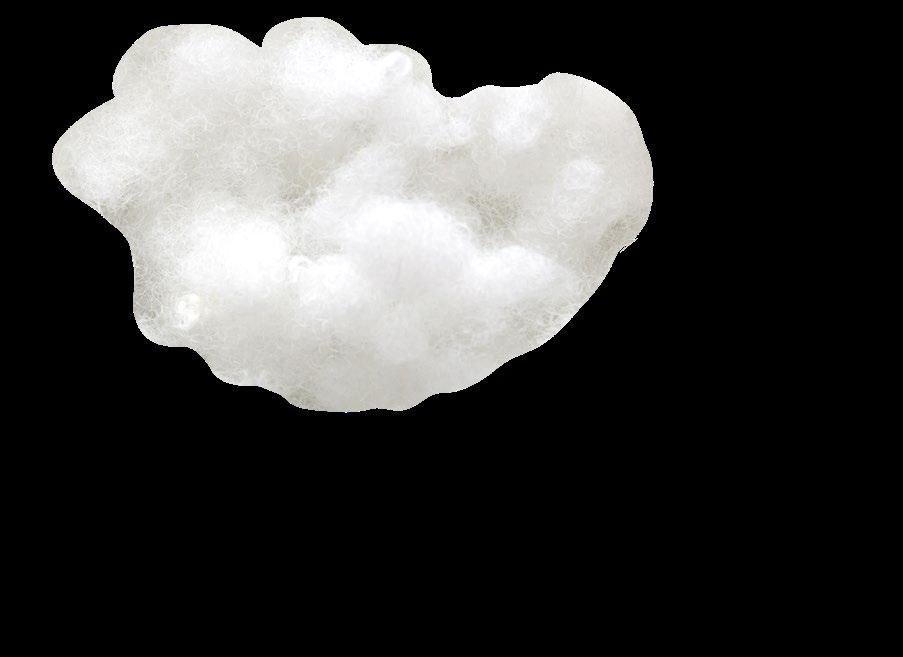
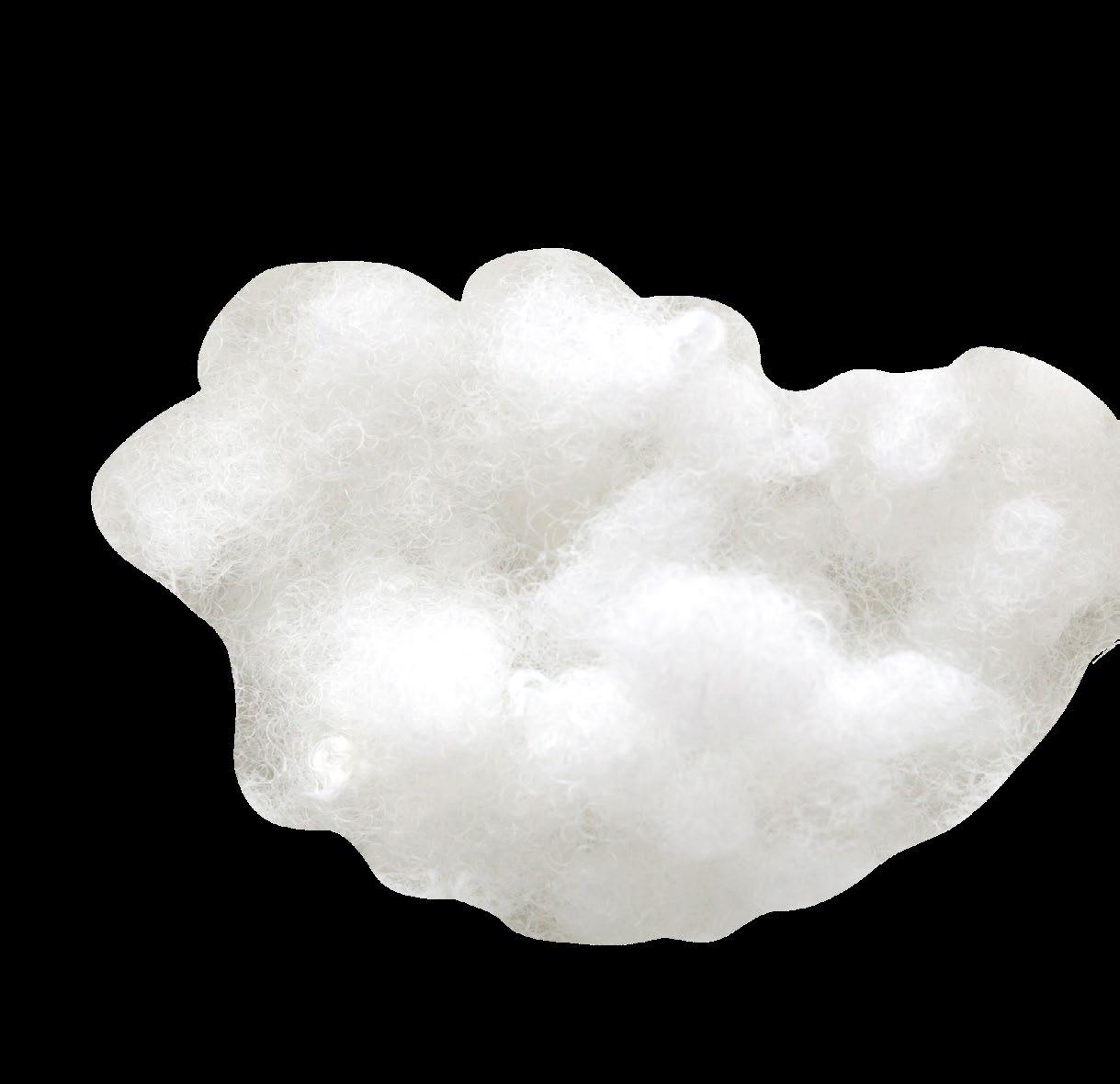 Fibers supplied by Powered by
Fibers supplied by Powered by








 Fibers supplied by Powered by
Fibers supplied by Powered by
Summary: The amount of apparel that winds up in landfills instead of being re-used, repurposed or recycled is astronomical. The EPA in the United States indicates that the main source of municipal waste in our landfills is clothing. Over 10.5 million tons of clothing ends up in landfills each year. The PrimaLoft® Bio™ fiber (both with and without silicone based finish) was tested according to ASTM D5511 Standard Test Method For Determining The Anaerobic Biodegradation of Plastic Materials Under High Solids Anaerobic Digestion Conditions at Eden Research Laboratories in Albuquerque, New Mexico to determine the biodegradation rate of the fiber in landfill environments.
Test Procedure: The test method ASTM D5511 determines the degree and rate of anaerobic biodegradation (without the presence of oxygen) of synthetic plastic materials in a high solids, static inoculum. The method simulates an accelerated biodegradation process in an anaerobic environmewnt that is typically present in an average landfill. Samples are exposed to an inoculum (containing microbes) that is derived from kitchen waste, municipal waste, and other materials found in compost and landfills. The samples are tested at 52°C with at least 20% solids in the test vessel. The determination of the degree and rate of biodegradation is calculated from the quantity of carbon dioxide and methane biogas that is generated over a certain period of time from the biodegradation of the plastic materials. A positive control and a negative control are included in the test procedure to assure the test has achieved the proper conditions for expected biodegradation levels.
Results: The PrimaLoft® Bio™ (siliconized) fibers biodegraded 93.8% at 646 days compared to only 1.1% biodegradation of the standard recycled polyester fiber (negative control) at the same time period. No biogas was further observed at this point and the PrimaLoft® Bio™ (siliconized) fiber was determined to have completed the biodegradation process at this time period. The PrimaLoft® Bio™ (dry) fibers biodegraded 65.0% at 646 days and 83.4% at 899 days compared to only 1.8% biodegradation of the standard recycled polyester fiber (negative control) at the same time period. Biogas continues to be observed and so the biodegradation process has been allowed to continue on the PrimaLoft® Bio™ (dry) fiber.
Conclustion: PrimaLoft® Bio™ polyester fibers (both siliconized and dry) have been confirmed by an independent third-party laboratory using method ASTM D5511 to biodegrade in an anaerobic landfill environment.
This ASTM test method is equivalent to ISO 15985.
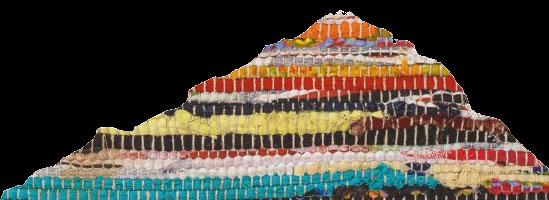 ASTM D5511
Standard test method for determining anaerobic biodegradation of plastic under high-solids anaerobicdigestion conditions.
ASTM D5511
Standard test method for determining anaerobic biodegradation of plastic under high-solids anaerobicdigestion conditions.
NOTE:Theabovecontenthasbeenprovidedbyathird-partytestingfacility.
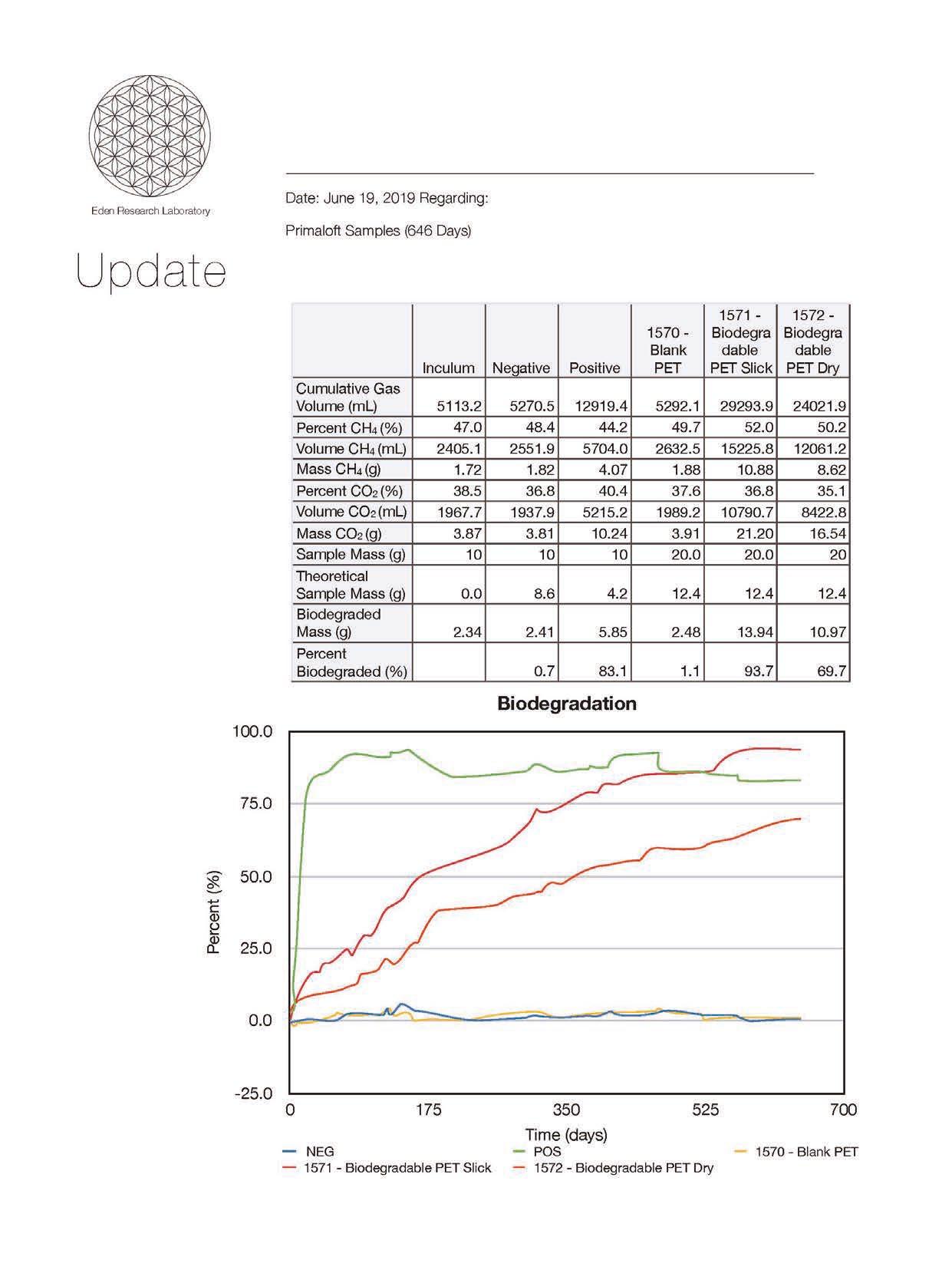
To: Primaloft

Date: February 4, 2021
From: Thomas Poth
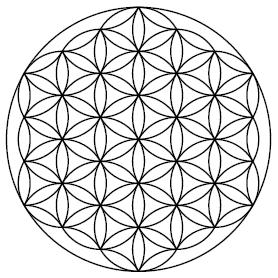
NOTE: The above content has been provided by a third-party testing facility.
Summary: Microplastics in the ocean is an ecological and environmental concern. The use of microfibers in clothing and other applications has garnered attention by environmentalists as one of the potential sources of microplastics in the ocean requiring immediate corrective action. It is important for there to be material solutions that address accidental leakage of microfibers into ocean environments. PrimaLoft® Bio™ utilizes a technology that enables polyester fibers to biodegrade in marine environments ultimately reducing the accumulation of microplastic waste in the ocean over time. The PrimaLoft® Bio™ fiber was tested according to ASTM D6691 Standard Test Method

For Determining Aerobic Biodegradation Of Plastic Materials In The Marine Environment By A Defined Microbial Consortium Or Natural Sea Water Inoculum at Eden Research Laboratories in Albuquerque, New Mexico to determine the biodegradation rate of the fiber in natural sea water.
Test Procedure: The test method ASTM D6691 determines the degree and rate of aerobic biodegradation of synthetic plastic material exposed to marine microorganisms found in natural sea water. This is an accelerated test due to the elevated temperature of the sea water under laboratory conditions. A positive control and a negative control are included in the test for comparison purposes as well as to validate that the conditions of the test were accurately prepared. The plastic material is exposed to a natural sea water inoculum (containing marine microorganisms). The inoculum used by Eden Research Labs is a 50/50 mixture containing sea water from both the East and West coasts of the United States. The test was conducted at 30°C and the inoculum is consistently agitated to simulate water movement. The determination of the degree and rate of biodegradation is calculated based on the quantity of carbon dioxide that is generated from the biodegradation of the plastic materials.
Results: The PrimaLoft® Bio™ (siliconized) fiber biodegraded 87.9% at 1953 days compared to 3.5% biodegradation of the standard recycled polyester fiber (negative control) at the same time period. Similarly, the PrimaLoft® Bio™ (dry) fiber biodegraded 84% at 1563 days. Biogas continues to be observed on both fiber types and so the biodegradation process has been allowed to continue on the PrimaLoft® Bio™ fibers.
Conclusion: PrimaLoft® Bio™ polyester has been confirmed by an independent third-party laboratory using method ASTM D6691 to biodegrade in an aerobic sea water environment.
ASTM D6691 Standard test method for determining aerobic biodegradation of plastic materials in the marine environment by a defined microbial consortium or natural sea water inoculum.Regarding: Aerobic Research ASTM D6691 for Primaloft Samples in 973 days



NOTE: The above content has been provided by a third-party testing facility.

thomas.poth@edenresearchlab.com

To: Primaloft

Date: January 27, 2023
From: Thomas Poth
Number of pages including cover: 1
Regarding: Aerobic Research ASTM D6691 for Primaloft Samples in 1953 days
NOTE: The above content has been provided by a third-party testing facility.
Summary: Textile apparel fibers in effluent water streams from residential washing machines and hygienic wipes containing textile fibers are frequently flushed into sewer systems that enter waste water treatment facilities. These textile fibers that enter waste water treatment facilities ultimately end up exposed in the surrounding environment. The PrimaLoft® Bio™ fiber (containing a silicone based finish) was tested according to ASTM D5210 Standard Test Method For Determining The Anaerobic Biodegradation of Plastic Materials In the Presence Of Municipal Sewage Sludge at Eden Research Laboratories in Albuquerque, New Mexico to determine the biodegradation rate of the fiber in sewage sludge typically found in wastewater treatment facilities.
Test Procedure: The test method ASTM D5210 determines the degree and rate of biodegradation of synthetic plastic materials when exposed to anaerobic-digester municipal sewage sludge from a wastewater treatment facility under laboratory conditions. The method simulates the environment of a wastewater treatment facility and is an accelerated test run at 35°C. A known positive control as well as a known negative control are included in the test parameters. The sample results are compared to the positive and negative control. The sample is exposed to an inoculum that was derived from sewage sludge from an anaerobic digester. Results are then calculated based on the production quantity of biogas (carbon dioxide and methane) given off over certain time periods.
Results: After 481 days of testing according to ASTM D5210, the PrimaLoft® Bio™ fiber has biodegraded 47.4%, compared to 0.9% biodegradation of the standard recycled polyester fiber (negative control). The sample has shown a relatively consistent rate of biodegradation (biogas continues to be produced), demonstrating that it has not leveled off yet and that the sample is continuing to biodegrade.
Conclusion: PrimaLoft® Bio™ polyester has been confirmed by an independent third-party laboratory using method ASTM D5210 to biodegrade in a Municipal Wastewater Treatment facility.
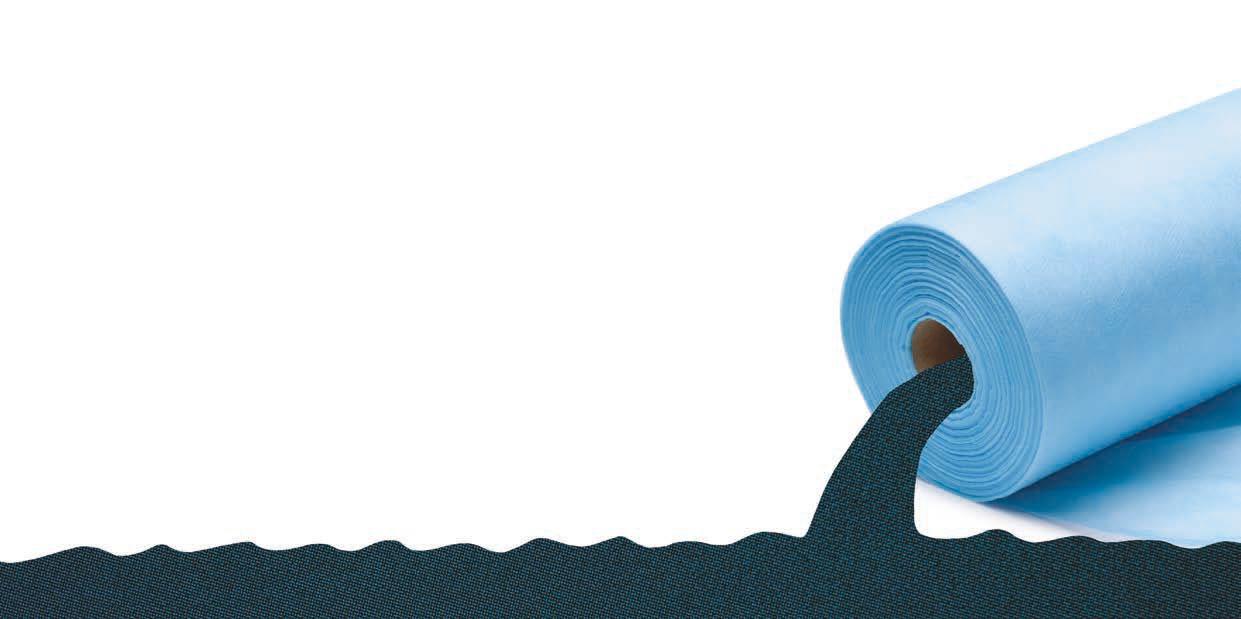 ASTM D5210
Standard test method for determining the anaerobic biodegradation of plastic materials in the presence of municipal sewage sludge.
ASTM D5210
Standard test method for determining the anaerobic biodegradation of plastic materials in the presence of municipal sewage sludge.
Eden Research Laboratory
2412 Princeton NE, Suite E
Albuquerque, NM 87107
T 505.508.3994
M 505.550.9316
thomas.poth@edenresearchlab.com

To: Primaloft
Date: February 12, 2023
From: Thomas Poth
Number of pages including cover: 1
Regarding: ASTM D5210 Primaloft Study update (481 days)

* The adjusted % biodegraded values are for informational purposes. It is not part of the method and will not be reported in the final report.
NOTE: The above content has been provided by a third-party testing facility.

Summary: The degree and rate of aerobic biodegradability of a plastic material in the environment determines the extent to which and time period over which plastic materials are mineralized by soil microorganisms. Disposal is becoming a major issue with the increasing use of plastics, and the results of this test method permit an estimation of the degree of biodegradability and the time period over which plastics will remain in an aerobic soil environment. This test method determines the degree of aerobic biodegradation by measuring evolved carbon dioxide as a function of time that the plastic is exposed to
This test method covers determination under laboratory conditions of the degree and rate of aerobic biodegradation of plastic materials, including formulation additives, in contact with soil. This test method is designed to measure the biodegradability of plastic materials relative to a reference material in an aerobic environment. This test method is designed to be applicable to all plastic materials that are not inhibitory to the bacteria and fungi present in soil.
Results: After 322 days of testing according to ASTM D5988, the PrimaLoft® Bio™ fiber has biodegraded 50.1%, compared to 0% biodegradation of the standard polyester fiber (negative control). The sample has shown a relatively consistent rate of biodegradation (biogas continues to be produced), demonstrating that it has not leveled off yet and that the sample is continuing to biodegrade.
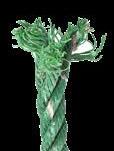
Conclusion: PrimaLoft® Bio™ polyester has been confirmed by an independent third-party laboratory using method ASTM D5988 to biodegrade in contact with soil.

Standard test method for determining the anaerobic biodegradation of plastic materials in soil.
This ASTM test method is equivalent to ISO 17556.
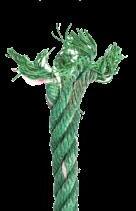 ASTM D5988
ASTM D5988
To: Primaloft

Date: April 4, 2023
From: Thomas Poth
Number of pages including cover: 1 Regarding: ASTM D5988 - Study Sample (322 Days)

NOTE: The above content has been provided by a third-party testing facility.
Summary: PrimaLoft, Inc. tested the biodegradability of PrimaLoft® Bio™ polyester fiber according to ASTM D5511 (Determining Anaerobic Biodegradation of Plastic Materials) for 646 days at Eden Research Labs. Once the sample had achieved 93.7% biodegradation, the sample was determined to have achieved complete biodegradation. The Primaloft® Bio™ sample was considered spent and biodegradation testing was ceased. The spent inoculum was preserved for subsequent toxicology analysis in order to determine if there were any remaining substances of concern.
Toxicology Analysis: The chemical composition of the spent inoculum was tested according to Pyrolysis Gas Chromatography Mass Spectrometry (PYMS) at Jordi Labs located in Mansfield, MA. PYMS is a method of chemical analysis in which a sample is heated to decomposition to produce smaller molecules that are separated by gas chromatography and then detected by mass spectrometry. PYMS is an instrumental method that enables the characterization of the molecular complexes found in virtually all materials even at trace levels.
The spent inoculum as well as a blank inoculum control sample were screened by PYMS for the presence of residual PET as well as all degradation components of PET. The blank inoculum is of the same inoculum lot as the spent inoculum, was exposed to the same biodegradation testing conditions for the same period of time as the spent inoculum, but did not contain the bio fiber sample.
Results: ANo compounds, fragments, monomers, nor additives consistent with PET were found in the spent inoculum. Compounds consistent with the fiber finish were detected at trace levels.
Conclusion: PrimaLoft® Bio™ polyester has been confirmed by an independent third party laboratory using scientific methodology to have achieved near complete biodegradation. No substances of concern were detected. Based on the results of the chemical composition analysis, it is anticipated that a germination study should show there is no risk of soil pollution due to plastic degradation. Actual results of a germination study will be forthcoming.
Pyrolysis Gas Chromatography Mass Spectrometrytoxicology analysis in order to determine if there were any remaining substances of concern.
 PYMS
PYMS
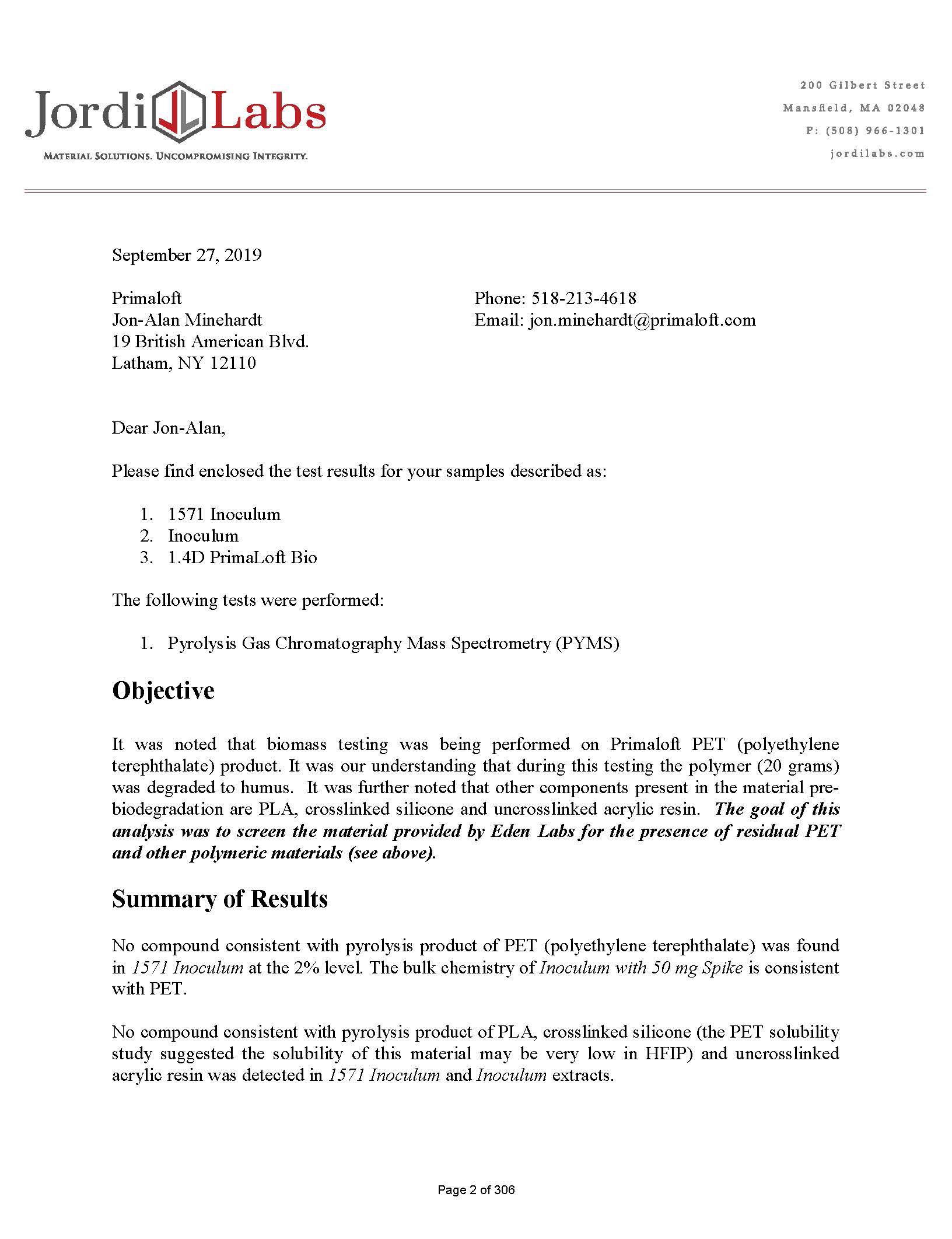

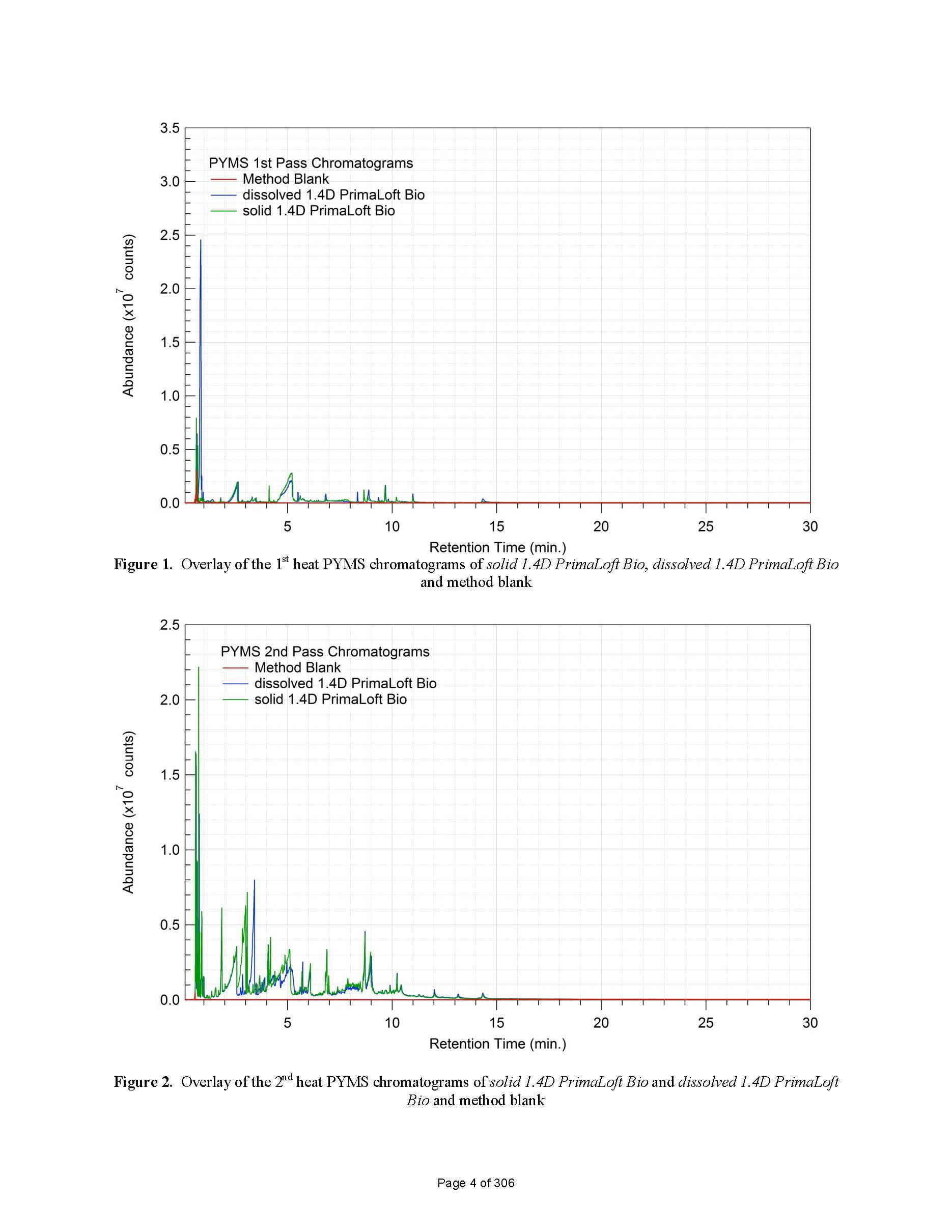
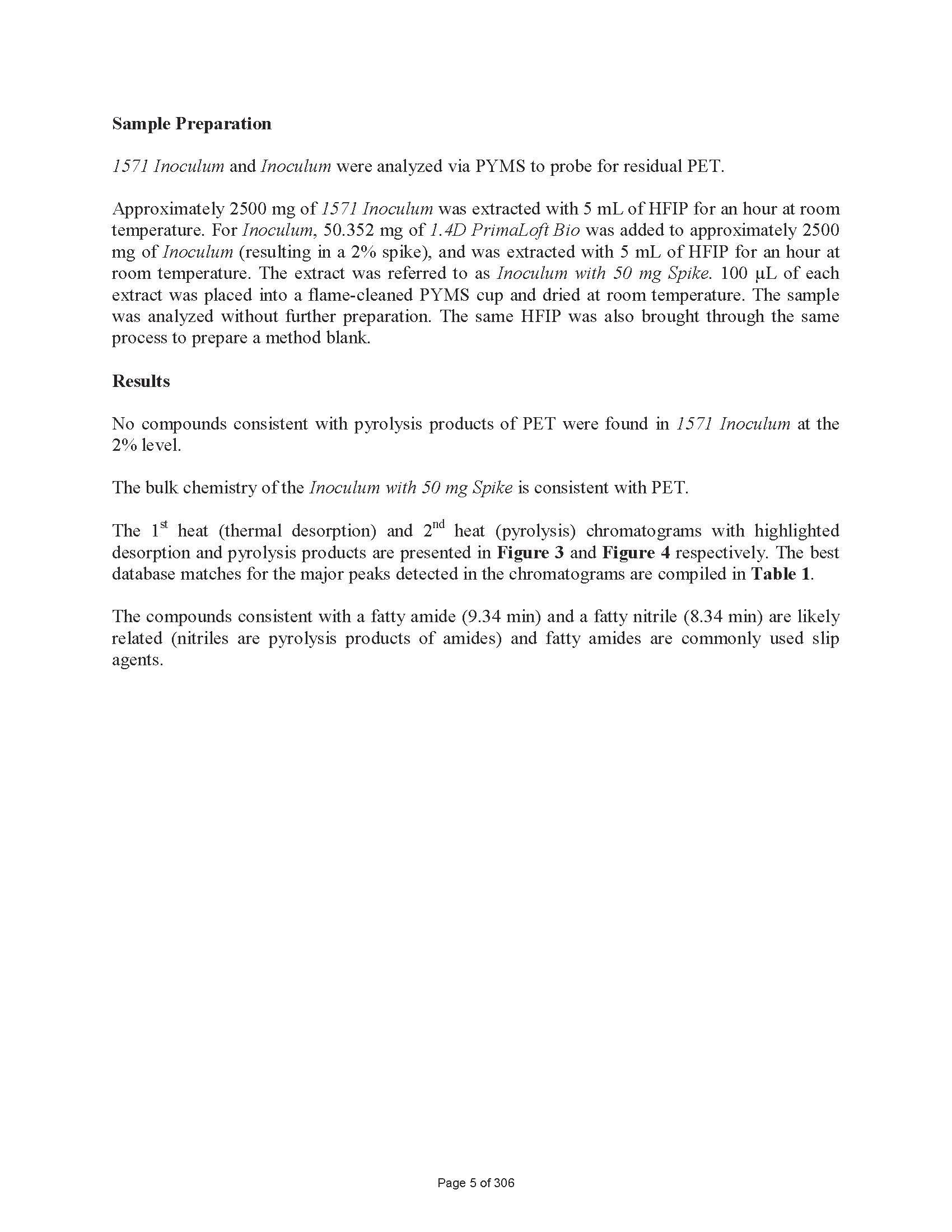
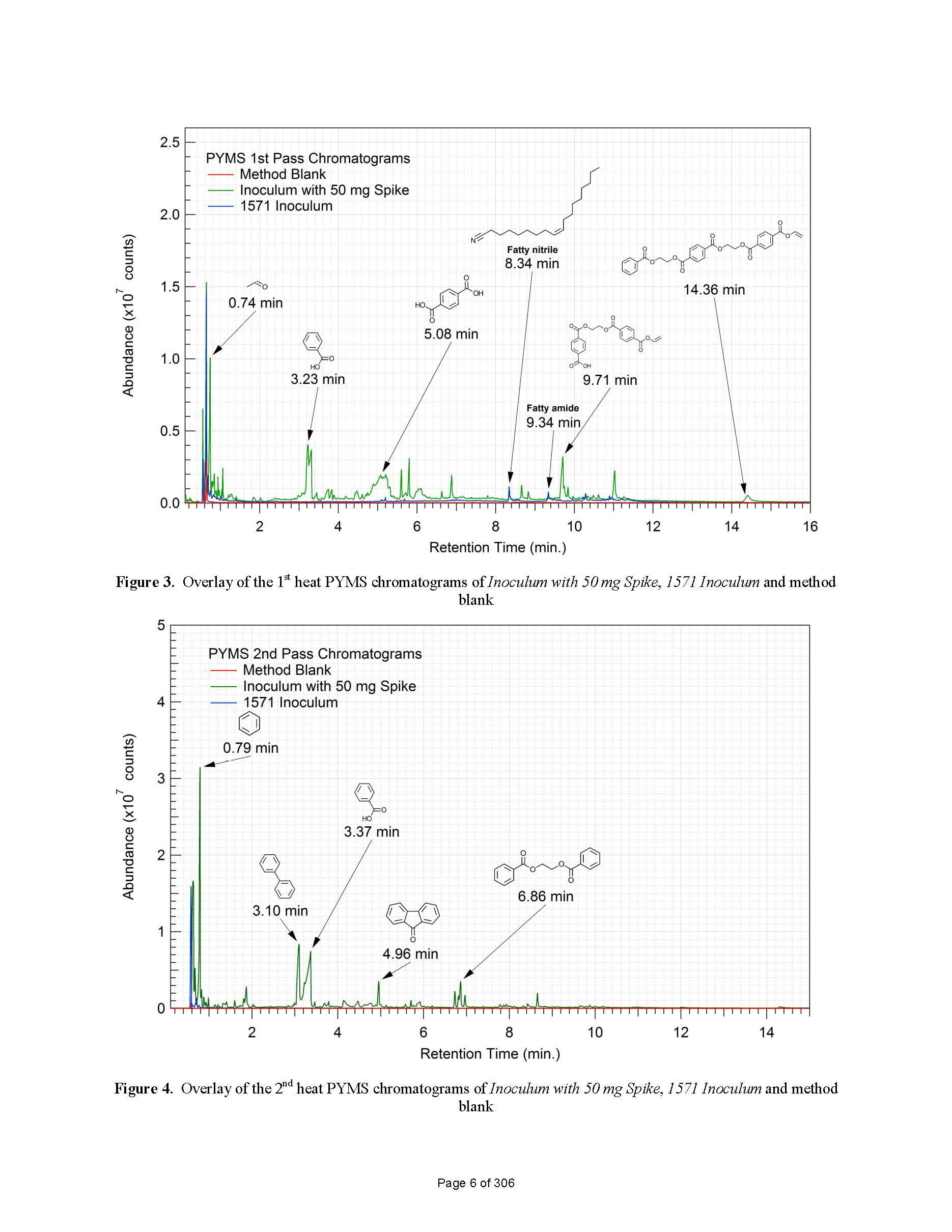
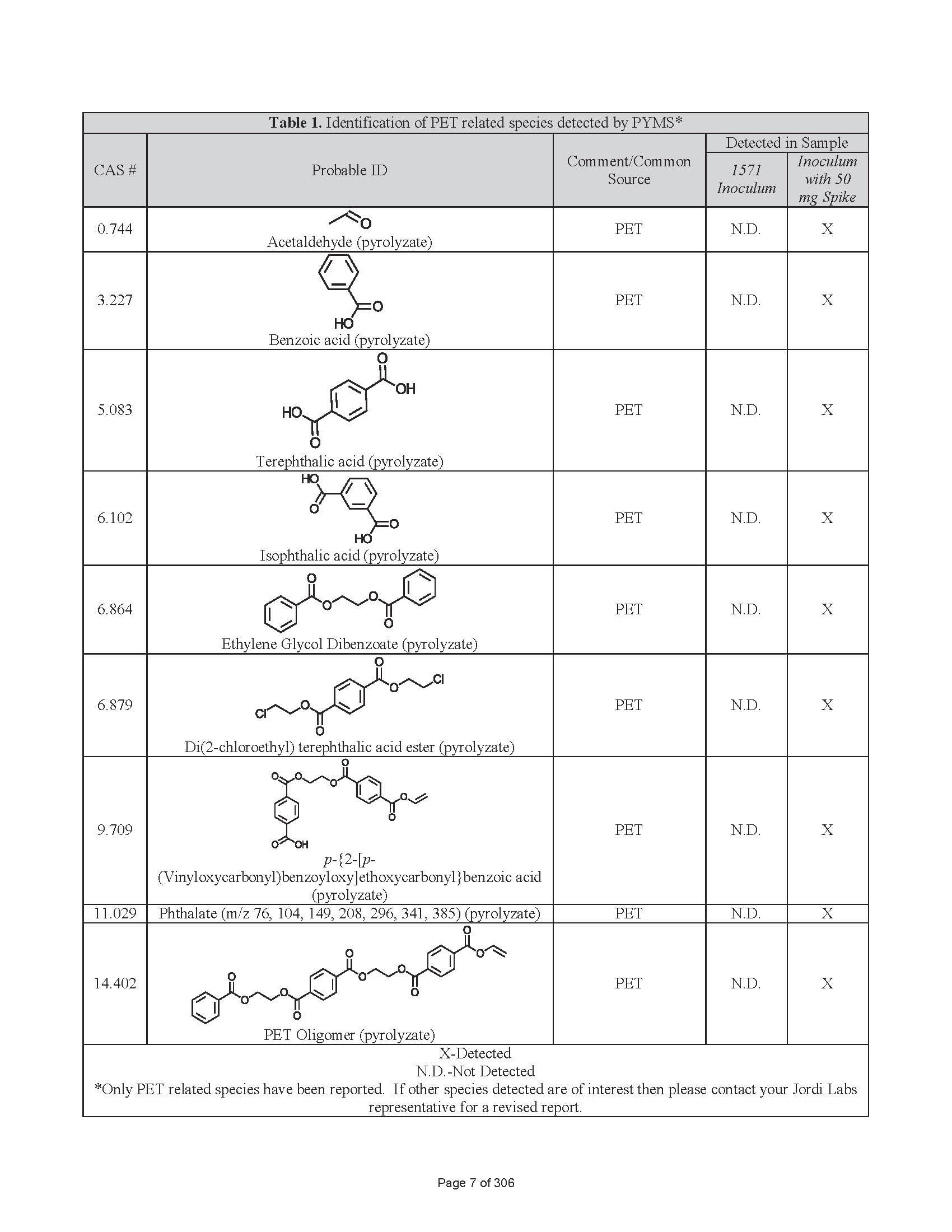
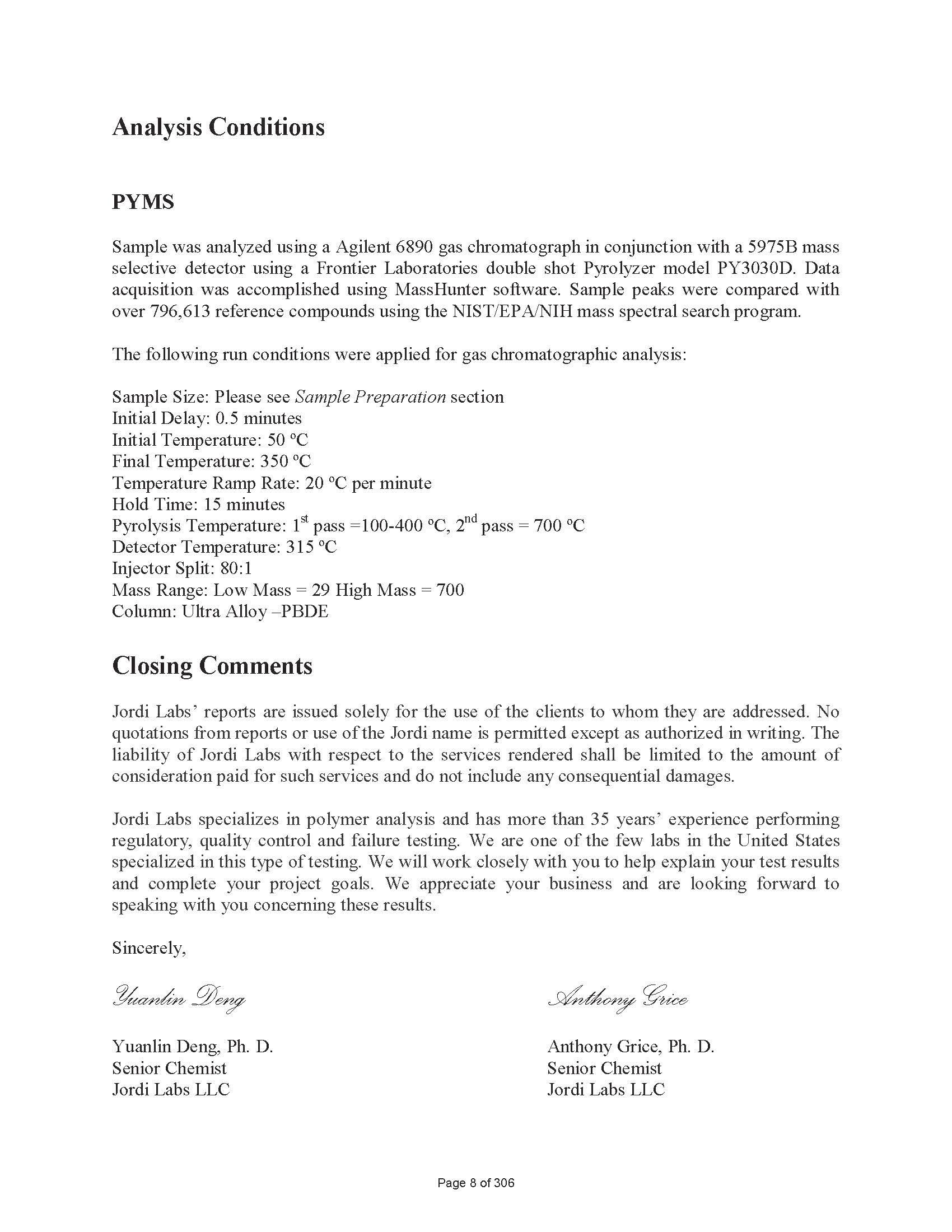

Summary: PrimaLoft, Inc. analyzed spent inoculum containing biodegraded PrimaLoft® Bio™ polyester fiber to determine if there was an environmental risk of soil pollution related to plastic biodegradation. The PrimaLoft® Bio™ fiber was biodegraded according to ASTM D5511 (Determining Anaerobic Biodegradation of Plastic Materials) for 646 days at Eden Research Labs, and the sample was determined to have achieved complete biodegradation once it reached 93.7% conversion into biogas. The spent inoculum sample was then tested according to ASTM E1963 (Standard Guide for Conducting Terrestrial Plant Toxicity Tests) to determine if there was any effect on germination and early plant growth.
Germination Study: The germination study analyzed the plant growth of three different seed varieties Bean, Corn, Pea planted in a general soil mixture combined with inoculum. The inoculum was combined with general soil at a mixture of 3 parts general soil and 2 parts inoculum. The study investigated plant growth in a general soil mixture with spent inoculum compared to a general soil mixture with the blank inoculum. The blank inoculum having not been exposed to PrimaLoft® Bio™ fiber. The study also included general soil contaminated with boric acid to represent a control with known inhibited plant growth to demonstrate adverse conditions.
Soil/Inoculum Mixture (3 parts general soil : 2 parts inoculum)
• Adverse Sample – General soil with boric acid added
• Blank Inoculum – 3 parts general soil : 2 parts blank inoculum
• Spent Inoculum – 3 parts general soil : 2 parts spent inoculum


The test is then measured as a percentage by how many seeds grew into plants, the epicotyl length (stalk of the plant above the seed leaves or cotyledons) and the hypocotyl length (stalk of the plant below the seed leaves or cotyledons and the roots) (Figure 1.). The test also measures the average weight of the plants that grew in each of the samples.
ASTM E1963 (Standard Guide for Conducting Terrestrial Plant Toxicity Tests) todetermine if there was any effect on germination and early plant growth.


Results: The growth and measurements of the plants showed that the boric acid did in fact hinder germination as well as the general quality of the plants that grew. The plants that grew in the blank inoculum mixed with general soil compared to the plants that grew in the spent inoculum that contained the biodegraded PrimaLoft® Bio™ fiber showed to be comparable to the blank inoculum in regards to the germination rate and general quality of plants. Also, if you compare the hypocotyl lengths and the epicotyl lengths, the adverse control sample showed lower growth compared to the blank inoculum and the spent inoculum. Lastly, the plant weights are also higher in the blank inoculum and the spent inoculum then the adverse control. When comparing the inoculum and sample the weights, and hypocotyl and epicotyl lengths are all similar.
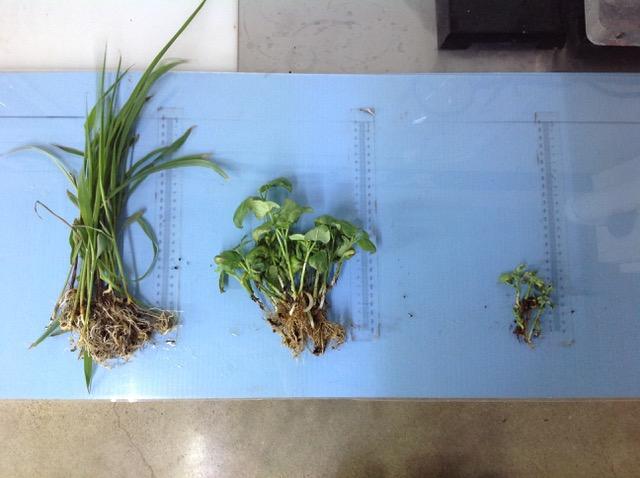
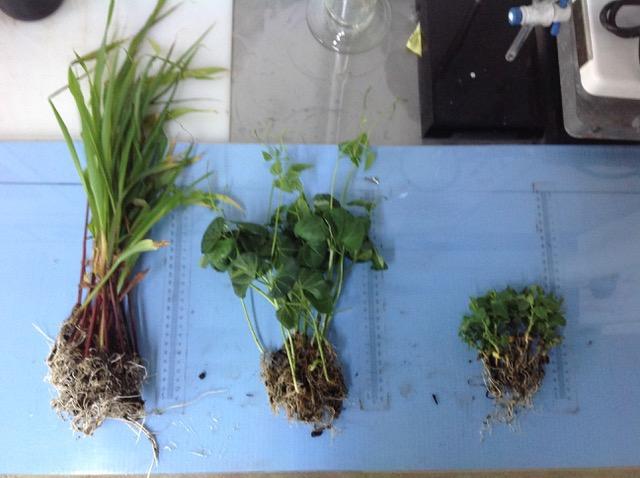
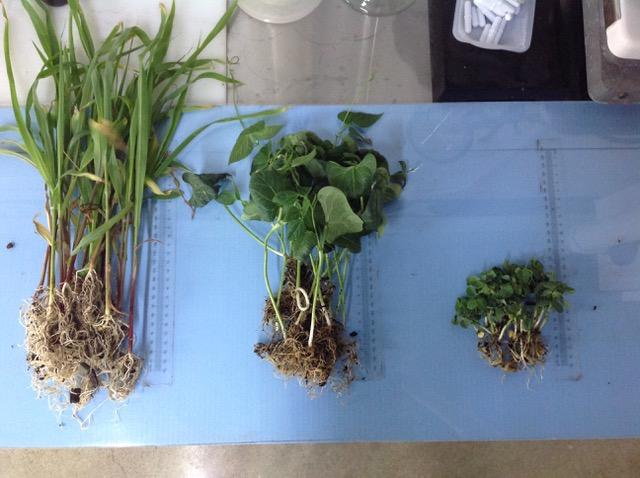
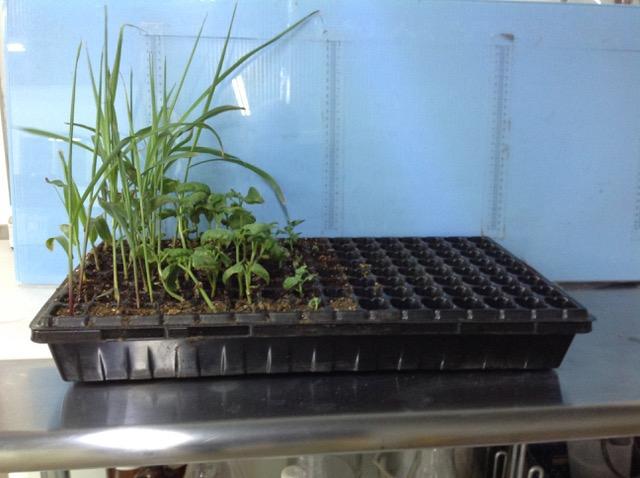
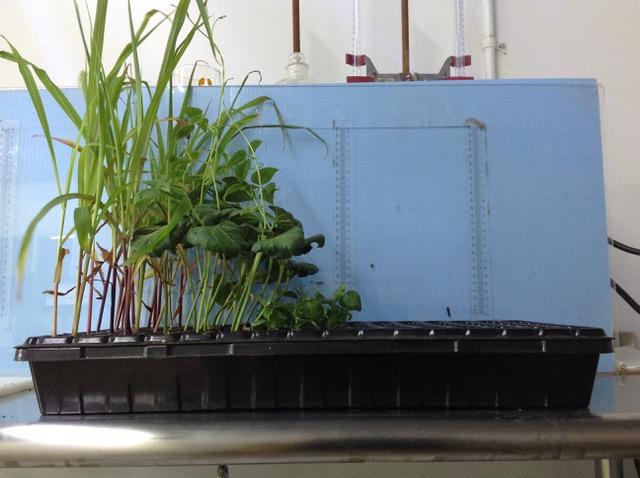
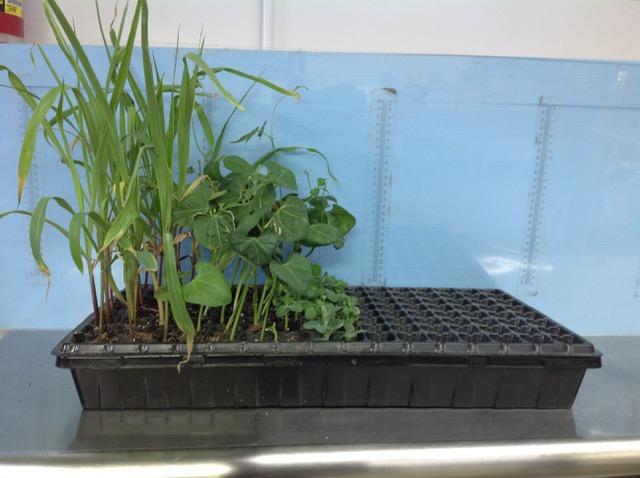
Conclusion: PrimaLoft® Bio™ polyester has been confirmed by an independent third-party laboratory using method ASTM E1963, that there is no environmental risk of soil pollution associated with PrimaLoft biodegraded polyester fibers. The spent inoculum demonstrated no toxic pollution that would hinder plant growth.



ASTM E1963 (Standard Guide for Conducting Terrestrial Plant Toxicity Tests) todetermine if there was any effect on germination and early plant growth.
 Positive Innoculum PrimaLoft 1571
Figure 1. Source: Google Images
Figure 2
Positive Innoculum PrimaLoft 1571
Figure 1. Source: Google Images
Figure 2

